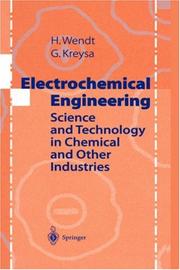| Listing 1 - 7 of 7 |
Sort by
|
Book
Year: 1960 Publisher: New York : McGraw-Hill,
Abstract | Keywords | Export | Availability | Bookmark
 Loading...
Loading...Choose an application
- Reference Manager
- EndNote
- RefWorks (Direct export to RefWorks)
Book
Year: 1950 Publisher: Paris : Dunod,
Abstract | Keywords | Export | Availability | Bookmark
 Loading...
Loading...Choose an application
- Reference Manager
- EndNote
- RefWorks (Direct export to RefWorks)
Periodical
ISSN: 18733859 00134686 Year: 1959 Publisher: Oxford ; New York, N.Y. : Elsevier Science
Abstract | Keywords | Export | Availability | Bookmark
 Loading...
Loading...Choose an application
- Reference Manager
- EndNote
- RefWorks (Direct export to RefWorks)
Electrochemistry --- Electrochemistry, Industrial --- Electrochemistry. --- Électrochimie --- Électrochimie industrielle --- Elektrochemie. --- Périodiques. --- Electrochemistries --- Industrial electrochemistry --- Industrial applications --- Chemistry, Technical
Periodical
ISSN: 07477406 Year: 1980 Publisher: Chichester : New York, N.Y., U.S.A. : Published for the Society of Chemical Industry by E. Horwood ; Halsted [distributor],
Abstract | Keywords | Export | Availability | Bookmark
 Loading...
Loading...Choose an application
- Reference Manager
- EndNote
- RefWorks (Direct export to RefWorks)
Chlorine industry. --- Alkali industry and trade. --- Electrochemistry, Industrial. --- Chlore --- Chlore --- Technologie --- Chlorures alcalins --- Électrochimie industrielle. --- Alkali industry and trade. --- Chlorine industry. --- Electrochemistry, Industrial. --- Chlorine --- Technology --- Alkalies --- Industries. --- Industrie et commerce.

ISBN: 3540643869 3642084060 366203851X Year: 1999 Publisher: Berlin ; New York : Springer,
Abstract | Keywords | Export | Availability | Bookmark
 Loading...
Loading...Choose an application
- Reference Manager
- EndNote
- RefWorks (Direct export to RefWorks)
Electrochemical Engineering sounds very much like chemical engineering, but the chemists, electro chemists, material scientists and whoever else comes into touch with technical electrochemical systems very soon gets the feeling, that chemical engineering wisdom will not get them very far in enhancing their un derstanding and helping them to solve their problems with technical electro chemical devices. Indeed not only the appearance of but also the physics and physical chemistry in electrochemical reactors - electrolyzers, batteries or fuel cells and others - are quite different from that of normal chemical reactors. Next to interfacial charge transfer and current density distributions is the relatively high importance of mass transfer and its hindrance in liquid electrolytes which distinguishes electrolyzers from chemical reactors. Therefore electrochemical engineering science became a science branch which at first developed with little reference to chemical engineering treating the relevant topics on a high mathe maticallevel. This has led to a certain perfection, which today - in principl- allows us to model almost any desired electrolyzer or cell configuration with nu merical methods to a degree and precision which satisfies the highest demands. This is classical chemical engineering stuff, which, however, neglects the chem ical side of electrochemical technology.
Electrochemistry, Industrial. --- Electrochimie industrielle --- Électrochimie industrielle. --- Electrochemistry. --- Chemical engineering. --- Physical chemistry. --- Electrical engineering. --- Industrial Chemistry/Chemical Engineering. --- Physical Chemistry. --- Electrical Engineering. --- Electric engineering --- Engineering --- Chemistry, Theoretical --- Physical chemistry --- Theoretical chemistry --- Chemistry --- Chemistry, Industrial --- Engineering, Chemical --- Industrial chemistry --- Chemistry, Technical --- Metallurgy --- Chemistry, Physical and theoretical --- Électrochimie industrielle.
Periodical
ISSN: 00134686 Year: 1959 Publisher: Oxford Pergamon
Abstract | Keywords | Export | Availability | Bookmark
 Loading...
Loading...Choose an application
- Reference Manager
- EndNote
- RefWorks (Direct export to RefWorks)
Chemistry --- Electrochemistry --- Electrochemistry, Industrial --- Electrochimie --- Electrochimie industrielle --- Periodicals --- Périodiques --- Electrochemistry. --- Électrochimie --- Électrochimie industrielle --- Elektrochemie. --- Périodiques. --- 54 --- Chemistry. Mineralogical sciences --- Analytical Chemistry --- Biochemistry --- Physical Chemistry --- Corrosion --- Life Sciences --- Material Science and Metallurgy --- Chemistry. --- Corrosion. --- Life Sciences. --- Material Science and Metallurgy. --- 54 Chemistry. Mineralogical sciences --- Périodiques --- EJCHIMI EJINGEN ELSEVIER-E EPUB-ALPHA-E EPUB-PER-FT --- 54 Chemie. Kristallografie. Mineralogie --- Chemie. Kristallografie. Mineralogie --- Journal --- Electrochemistry - Periodicals --- Electrochemistry, Industrial - Periodicals
Periodical
ISSN: 0021891X 15728838 Year: 1971 Publisher: Dordrecht Springer.
Abstract | Keywords | Export | Availability | Bookmark
 Loading...
Loading...Choose an application
- Reference Manager
- EndNote
- RefWorks (Direct export to RefWorks)
Chemistry --- Electrochemistry, Industrial --- Electrochimie industrielle --- Periodicals --- Périodiques --- Électrochimie industrielle --- 621.35 <05> --- Electrochemical technology--Tijdschriften --- Chemical Engineering --- Electrochemistry --- Pollution (Air, Noise, Soil and Water) & Control --- Corrosion --- Treatment & Finishing --- Engineering --- Environmental Sciences --- Material Science and Metallurgy --- Chemistry. --- Treatment & Finishing. --- Engineering. --- Environmental Sciences. --- Material Science and Metallurgy. --- 621.35 <05> Electrochemical technology--Tijdschriften --- Périodiques --- EBSCOASP-E EJCHIMI EPUB-ALPHA-J EPUB-PER-FT SPRINGER-E --- Industrial electrochemistry --- Industrial applications --- Chemistry, Technical
| Listing 1 - 7 of 7 |
Sort by
|

 Search
Search Feedback
Feedback About UniCat
About UniCat  Help
Help News
News